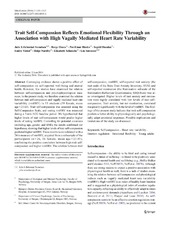Trait self-compassion reflects emotional flexibility through an association with high vagally mediated heart rate variability
Svendsen, Julie Lillebostad; Osnes, Berge; Binder, Per-Einar; Dundas, Ingrid; Visted, Endre; Nordby, Helge; Schanche, Elisabeth; Sørensen, Lin
Peer reviewed, Journal article
Published version

Åpne
Permanent lenke
https://hdl.handle.net/1956/15362Utgivelsesdato
2016-10Metadata
Vis full innførselSamlinger
Originalversjon
https://doi.org/10.1007/s12671-016-0549-1Sammendrag
Converging evidence shows a positive effect of self-compassion on self-reported well-being and mental health. However, few studies have examined the relation between self-compassion and psychophysiological measures. In the present study, we therefore examined the relation between trait self-compassion and vagally mediated heart rate variability (vmHRV) in 53 students (39 female, mean age = 23.63). Trait self-compassion was assessed using the Self-Compassion Scale, and resting vmHRV was measured during a 5-min ECG baseline period. We hypothesized that higher levels of trait self-compassion would predict higher levels of resting vmHRV. Controlling for potential covariates (including age, gender, and BMI), the results confirmed our hypotheses, showing that higher levels of trait self-compassion predicted higher vmHRV. These results were validated with a 24-h measure of vmHRV, acquired from a subsample of the participants (n = 26, 16 female, mean age = 23.85), confirming the positive correlation between high trait self-compassion and higher vmHRV. The relation between trait self-compassion, vmHRV, self-reported trait anxiety (the trait scale of the State-Trait Anxiety Inventory; STAI) and self-reported rumination (the Rumination subscale of the Rumination-Reflection Questionnaire; RRQ-Rum) was also investigated. Higher levels of trait anxiety and rumination were highly correlated with low levels of trait self-compassion. Trait anxiety, but not rumination, correlated marginally significantly with the level of vmHRV. The findings of the present study indicate that trait self-compassion predicts a better ability to physiologically and psychologically adapt emotional responses. Possible implications and limitations of the study are discussed.
